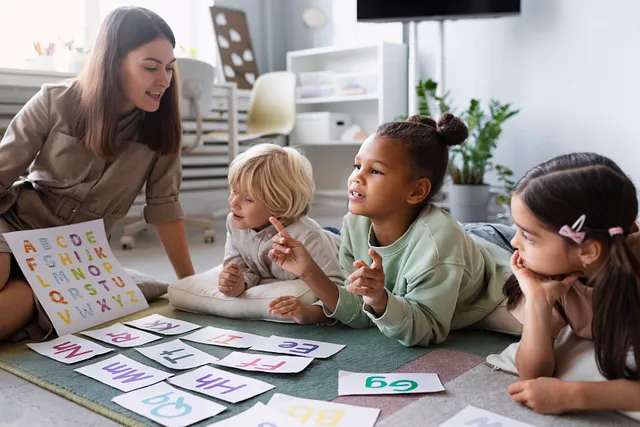Embracing the Montessori Method: A Guide to Teacher Training
Embracing the Montessori Method: A Guide to Teacher Training
Blog Article

The Montessori method cultivates a love of learning in children through hands-on experiences and independent activities. For aspiring educators, embarking on teacher training in this unique pedagogy offers a fulfilling journey. Through rigorous programs, individuals gain a deep understanding of Montessori principles and learn to apply them effectively in the classroom.
- Fundamental components of Montessori training often include observing experienced teachers, participating in practical workshops, and exploring child development theories.
- Aspiring Montessori educators sharpen their skills in creating a prepared environment that stimulates children's natural curiosity and growth.
- Furthermore, training programs emphasize the importance of observing individual children, adapting lessons to their needs, and fostering a nurturing learning community.
Eventually, Montessori teacher training equips educators with the knowledge and skills to create joyful and enriching learning experiences that empower children to reach their full potential.
Unlocking Potential: Montessori Teacher Education and Development
A compelling journey into the world of Montessori education begins with a dedicated teacher initiative. Teachers are at the heart of the here Montessori method, guiding young minds to thrive through self-directed learning and exploration. Professional development opportunities allow Montessori educators to refine their skills. This ongoing journey cultivates a passionate community of teachers who are passionate to nurturing the full potential of every child. Through collaborative networks, sharing best practices and innovative strategies becomes a vital element in the evolution of Montessori teacher education.
Embark on Montessori: Exploring Teacher Certification Pathways
Are you intrigued by the innovative and nurturing approach of Montessori education? Do you dream of nurturing young minds in a engaging learning environment? If so, embarking on a Montessori teacher certification journey may be your ideal path. This article will explore the diverse avenues available to you, helping you chart the best fit for your aspirations.
The first step is exploring the fundamental principles of Montessori pedagogy. Engage with its philosophy of child-centered learning, where self-directed exploration and hands-on activities are paramount. There are numerous resources available, including online courses, to offer a solid foundation in Montessori theory.
- Recognition is crucial when selecting a teacher training program. Look for programs endorsed by reputable Montessori organizations such as AMI or MACTE.
- Consider your learning style and desires. Some programs offer traditional classroom settings to suit different learners.
- Connecting with other Montessori educators is invaluable. Attend conferences, join professional organizations, and participate in online communities to gain insights
Finally, remember that the journey of becoming a Montessori teacher is a lifelong commitment. Embrace ongoing professional development opportunities and seek continuous improvement to thrive in this rewarding field.
Nurturing Young Minds: The Foundations of Montessori Teacher Training
Embarking on the journey of becoming a dedicated educator requires a deep understanding of the philosophical principles that underpin the Montessori method. A comprehensive teacher training program provides aspiring teachers with the skills necessary to create a nurturing and stimulating setting where children can learn. Through hands-on learning, trainees engage in activities that illustrate Montessori practices, developing their capacity to guide children's learning and foster their autonomy.
- A robust training program will delve into the origins of Montessori education, exploring its essential beliefs and their application in today's educational landscape.
- Trainees will also examine the special qualities of a child's growth across various stages, gaining knowledge into how children learn best.
- Furthermore, training will equip educators with the methods to prepare a well-organized learning space that encourages children's involvement in meaningful learning activities.
Stepping into a Montessori Educator: Curriculum, Philosophy, and Practice
Venturing into the realm of Montessori education is a deeply fulfilling journey. At its core lies a profound belief in the innate capacity of every child to develop at their own pace. Montessori educators foster an environment that encourages independent exploration and discovery, guided by carefully prepared tools.
The curriculum itself is a living tapestry, designed to adapt to the evolving needs of each child. It integrates experiential learning across a wide range of subjects, from counting and writing to science.
A Montessori educator is more than just a instructor; they are a mentor, respecting each child's uniqueness. They establish a welcoming classroom community where children feel comfortable to experiment and learn at their full potential.
Nurturing a Passion for Knowledge: The Art and Science of Montessori Teaching
In the dynamic world of Montessori education, learning transcends the confines of traditional classrooms. It becomes an engaging journey guided by a dedicated teacher who acts as a mentor. Montessori philosophy revolves around the child's inherent desire to learn, fostering independence, self-discovery, and a lifelong love of knowledge. Through carefully prepared environments and practical activities, children are encouraged to explore their passions at their own pace. The instructor's role is crucial in monitoring each child's growth, offering support and recognizing their successes.
This integrated approach to education not only cultivates academic skills but also builds social, emotional, and intellectual abilities. Through interaction, children learn fundamental life skills such as problem-solving, communication, and empathy.
Report this page